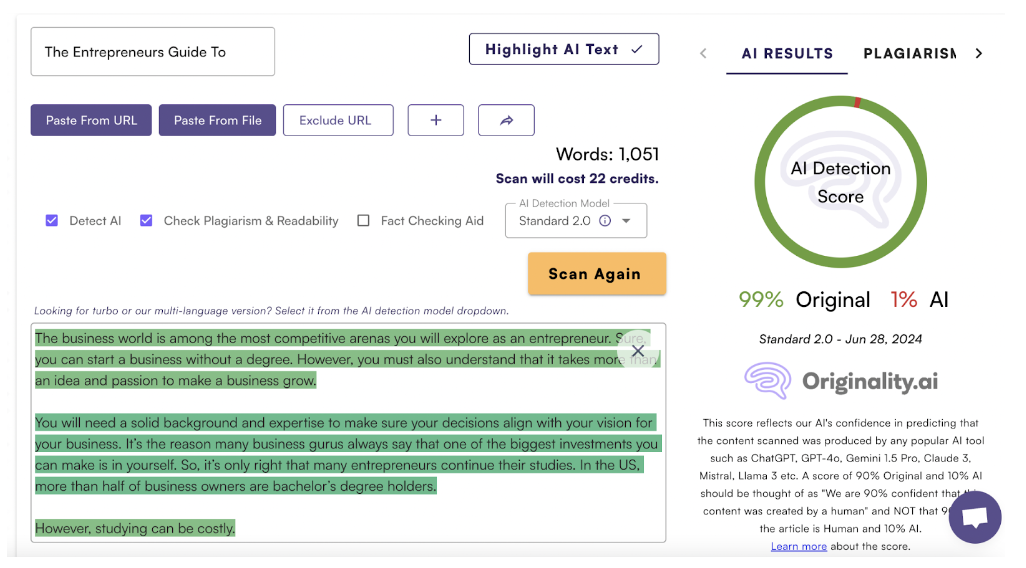The business world is among the most competitive arenas you will explore as an entrepreneur. Sure, you can start a business without a degree. However, you must also understand that it takes more than an idea and passion to make a business grow.
You will need a solid background and expertise to make sure your decisions align with your vision for your business. It’s the reason many business gurus always say that one of the biggest investments you can make is in yourself. So, it’s only right that many entrepreneurs continue their studies. In the US, more than half of business owners are bachelor’s degree holders.
However, studying can be costly.
Recent reports show that the current average student loan debt in the US is $38,787. For astute business owners, this money can be put to good use as business capital. Given this, it’s only necessary to explore education funding.
Importance of Education for Entrepreneurs
Here’s why you should consider going back to school:
Solid business education
Studying gives student entrepreneurs the leverage they need to be successful in running a business. Aside from business math, they can also develop digital competence and communication skills. The lack of education in these areas can be disadvantageous for those pursuing entrepreneurial endeavors.
For example, someone with limited digital competence may not maximize online platforms for marketing their products. Education is also critical for giving diverse perspectives to spur innovative thinking.
Access to resources and mentorship
Studying also means access to various resources and facilities that can enhance their learning and even entrepreneurial activities. For example, one who wants to build a start up focusing on biotechnology will need well-equipped laboratories. Alternatively, someone who plans to develop a revolutionary mobile app will need to learn different programming software and languages to ensure success.
Aside from resources, student entrepreneurs can also have access to valuable mentorship from industry experts and peers with in-depth experience in their fields.
Better networking opportunities
Networking is critical for business owners, and often, the first group they can build relationships with is within a campus. Campus networks can be critical for your marketing effort. If you attend a school with thousands of students, you can leverage this to promote your business.
When you become an alumni, you also get the support commonly afforded to a member. Remember that many alum members can be influential and help support and promote your business.
How Business Owners Can Fund Their Education
Entrepreneurs who don’t want to dip into the capital can explore these funding sources:
Use scholarship finders
One of the first resources you can explore to fund your studies is a scholarship. It’s cost-effective since you don’t have to worry about interest rates and repayment plans. In the 2022-2023 academic year, undergraduates in the US got merit scholarships averaging $12,088.
For student entrepreneurs, using a scholarship finder can help them narrow down their options to those that meet their needs. Here are some of the scholarships they can come across:
National Restaurant Association Educational Foundation Scholarships: This scholarship is ideal for those pursuing a business in the restaurant industry. This merit-based scholarship can provide aid from $2,500 to $10,000.
Jungle Scholar: For student entrepreneurs working to innovate within the SaaS and e-commerce industries, Jungle Scout offers $2,500 in financial aid.
GreenPal Business Scholarship: Aspiring student entrepreneurs can also apply for this scholarship if they have a 3.5 GPA. If they qualify, they can get a $2,000 scholarship paid out over four semesters.
The Empaxis Scholarship for Women in Business: Another specialized scholarship, Empaxis grants female college students interested in pursuing entrepreneurship with $2,000 aid.
Start a crowdfunding
If the scholarship grant isn’t enough to cover all the expenses, one funding source you can explore is crowdfunding. Through this method, you can raise funds with the help of a large pool of people. You can use this to support your education aims. Since this isn’t new, you have to make sure that you stand out from others. You must have a clear goal and a solid narrative so the community would be more than willing to help. Explore online platforms so you can reach more donors.
When you raise funds through crowdfunding, keep in mind that, like any scholarships or grants, you have accountability. Make sure you update them about your progress. Consider this as a form of goodwill. In fact, keeping them in the loop will help your business as these donors can also be your business supporters. When they see your success, they feel satisfaction they are part of your story.
Explore impact investing
When exploring educational financing, don’t overlook impact investing. This type of investing generates financial returns and social benefits by supporting ventures that solve environmental and social challenges. If your business venture has a sustainable and scalable business model and supports such initiatives, you have a good chance.
Consider blended financing
Depending on your chosen career path, having more than one source of educational funding is critical for success. Blended financing is one option you should consider. This type of financing combines grants, loans, guarantees, and equity. Try to leverage each of their strengths and lessen their risks.
Ideally, blended financing applies to educational initiatives with high social value but uncertain returns.
Apply for a business credit card
One of the challenges of being a student entrepreneur is their lack of credit rating. They often have little collateral for a loan, limited resources, and no professional experience. However, not many know they can build a strong business credit even if they have a low credit score. The key here is strengthening your personal credit.
Remember, lenders will look at personal credit before approval. One way to build this is by getting a business credit card. Once you’re approved, use it to build your business credit score. Credit card issuers often report usage and activity to credit bureaus. Make sure to pay on time and always maintain a low credit utilization.
Start early. The sooner you build your business credit, the better. It can establish that you have a long credit history. Note that this can also impact your score.
Explore Funding for Student Entrepreneurs
Having a solid educational and business foundation is critical for aspiring entrepreneurs. However, academic costs shouldn’t hinder this quest for knowledge and thirst for innovation. Recognize the importance of education and explore available funding.
Don’t hesitate to consider business credit to aid in financing. Again, investing in yourself will be the best business decision you will ever make.

Thumbnail provided by Freepik


